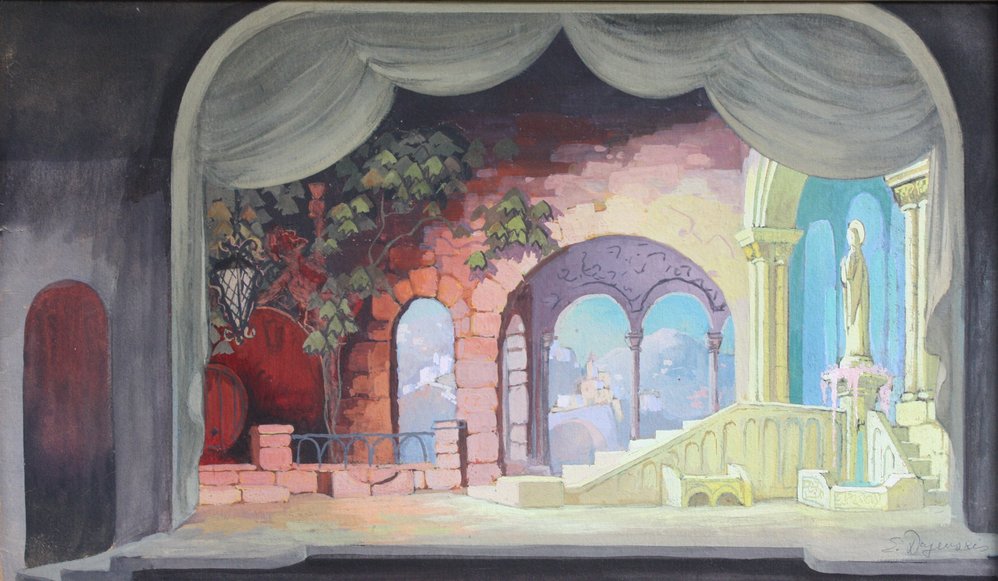Stop 14

Cavalleria Rusticana. Set design for Pietro Mascagni’s opera, performed by the Latvian Opera and Theater Company, Oldenburg, Germany. | Zemnieka gods. Dekorācija Pjetro Mascagni operai, Latviešu operas un teātra izpildījumā, Oldenburgā, Vācijā.
Tempera, 8.36 in x 16.60 in (21.27 cm x 42.23 cm), 1946.
The performing arts played a central role in sustaining the human spirit of postwar Germany’s Latvian refugee communities. By 1945, a professional opera company had formed in the city of Oldenburg, in northern Germany. Performers from the Latvian National Opera, including singers, conductors and musicians, all refugees, had decided that their talents must be put to work. A stage and orchestra pit was built by company members in a community building called the Latvian Artists House. Soon rehearsals began under the leadership of the Latvian composer and conductor Bruno Skulte. The opera company resolved that its productions would not be complete without scenery and costumes. My father was invited to design the sets for Mascagni’s Cavalleria Rusticana. This concept sketch represents one of the first opera productions to be realized in a displaced persons camp. The curtain for this production went up in June 1946. Later, my father would design sets for the Oldenburg Opera Company’s production of Rossini’s The Barber of Seville.
In His Own Words:
Sustaining the Human Spirit (Stops 14 – 18)
"The Latvian Theater of Meerbeck was organized in August 1945. In my wildest dreams I could never have imagined that this could be a reality—an opportunity to work for the Latvian theater, side-by-side with highly professional directors and great talents that included Janis Zarins, Osvalds Ursteins as well as actors from Riga’s National and Dailes theaters. This gave me an indescribable lift; it buoyed my spirits to do creative work that involved collaboration with an entire artistic ensemble. We gave it our all—both spiritually and physically. If one were to speak of a collective sense of ensemble work and a commitment to a theater ethic, then the Meerbeck Theater manifested this at the highest level. There was one shared goal: to serve and to create for the play. Career goals or material interests were of no consequence to anyone. This period solidified a feeling within me which in later years, while living in exile, compelled me to never leave the Latvian theater and community of actors."
Viņa
paša vārdos:
Stiprinot cilvēka
garīgo sajūtu (14. - 18. pietura)
„1945. gada augustā noorganizējās latviešu teātris Mērbekā. Sapnī nevarētu rādīties tas, kas tagad izrādījās realitāte – iespēja strādāt latviešu teātrim, pie tam ar augstas klases režisoriem, kā Jāni Zariņu, Osvaldu Uršteinu un ar Nacionālā un Dailes teātra aktieriem. Tas bija neaprakstāms pacilājums, kas spārnoja radošam darbam, kurā iekļāvās viss mākslinieku ansamblis, atdodams visus savus garīgos un fiziskos spēkus. Ja runā par kolektīvu ansambļa darbu un teātra ētiku, tas atrādījās augstākā pakāpē, ar vienu kopīgu mērķi: kalpot izrādes radīšanai. Karjera, vai materiālās intereses nevienam nebija nozīmīgas. Šis laiks manī nostiprināja to sajūtu, kas likusi vēlākos laikos nekad neatstāt latviešu aktieru saimi un teātri trimdā.”





